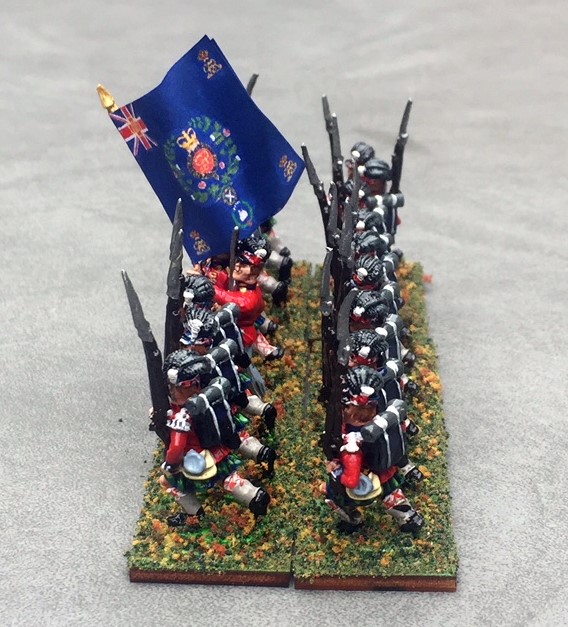The oldest of the Highland regiments in the the British army, the 42nd, officially the Royal Highlanders, but better known by its nickname, "The Black Watch", was raised in 1739.
This is surely one of the most famous units in the British army. During the French Revolutionary and Napoleonic Wars, it served in the Low Countries from 1793 - 1795, the West Indies 1796 - 1797, Gibraltar and Minorca 1798, Egypt 1801, Peninsula 1808 - 1809, Walcheren 1809, Peninsula again 1812 - 1814, and Waterloo 1815.
I have given the piper reversed colors, (dark blue faced red) although they probably wore red jackets similar to the rest of the men.
The flag is printed from Napflag, and enhanced with dark blue paint to most of the field and edges of the flag, and a bit of red paint as well. The GMB flag was just too big for the Old Glory flag staff!
I left the black ink lining off the tartan for this unit, and I think it shows a bit in the crispness of the Tartan as opposed to the earlier (and black lined) Gordons.
There is a dark blue oval on the back of the packs, but it is all but undetectable!
Pipes and Drums, 1st battalion, the Black Watch






Ach Laddie. That's a fine Regiment of Fellows you have there. Great job on that flag!! Painting Tartan gives a feeling of satisfaction too.
ReplyDeleteThank you David. I have found that using paint on the field colors of the free flags printed from Warflag/Napflag greatly increases the vividness of the colors.
DeleteSee, you are done and did not go blind after all. :-)
ReplyDeleteRight Joe... on the other hand I still have another 40 Highlander figures left, which could potentially be used to raise another two kilted regiments.
DeleteSomebody take them off my hands, please! :-)
Well done, Peter! I like your impressionistic leanings to rendering the tartan a lot. Fine looking regiment!
ReplyDeleteThanks, Jon. It is pretty hard to do anything other than impressionistic with Tartan, at least for me! Even in 28 mm; a tartan in the actual pattern and scaled size would be... well, almost invisible, becoming just a blend of colors.
DeleteNice looking Highlanders, Peter!
ReplyDeleteThanks, Dean!
DeleteSuper stuff Peter. Nice work on the tartan.
ReplyDeleteThey are simply storming into action...!!
Glad you like them, James. They certainly are energetic, aren't they?
DeleteAlways glad to see some tartans and to hear soms bagpipes...excellent job, painting and flag!
ReplyDeleteThanks for the kind words, as always, Phil!
DeleteSuperb job, sir! And may i be so bold as to add: "The lads are down to 5 rounds a man, Wellington! Dont worry, they'll stand."
ReplyDeleteThanks for the spirited comment, and the visit, Steven!
DeleteIf they are impressionistic, then you are the Monet of the tartan. Great job.
ReplyDeleteLOL, Lawrence! Just my lack of a square paintbrush/tartan stamp. I "squared off" the Tartan a bit more with the Gordons, using black lining.
DeleteWonderful work Peter! They look a fine regiment who will do good service on the field of honour! Nice job on the tartan - I don't think I have painted tartan for about 20 years now...and there is a good reason for it! Yours looks splendid though.
ReplyDeleteBest wishes,
Jason
Thanks, Jason! Until the past year, I last painted tartan circa 1973 - and that was wasted on airfix plastic!
DeleteVery nicely done, a classic Napoleonic battalion.
ReplyDeleteThanks John; indeed they are a Napoleonic classic!
DeleteGreat looking unit, another splendid go at tartan, it's almost tempting but I think my first go with highlanders will probably be for Flodden (without a hint of tartan!) Once again a lovely classic British regiment delightfully done!
ReplyDeleteBest Iain
Thanks for the support, Iain! They weren't THAT bad to paint. One problem is that now I am thinking maybe the Cameronians would look nice in their green facings...
DeleteThey are good!
ReplyDeleteGlad you like them, Aaron!
DeleteThat's a fine body of men you have yourself there!
ReplyDeleteThank you kindly, Ray!
DeleteLooks good and the stylised tartan very appropriate!
ReplyDeleteThanks, Mark!
DeleteI have always felt that doing the tartans in intense detail just makes them look muddy at table viewing distances.
ReplyDeleteThus I have also done a more 'impressionist' approach to tartans.
BRAVO
Thaks; a combination of tabletop effect and feasibility, I'd say! :-)
DeleteThat's a very nice and effective paint job! They look perfect for the table.
ReplyDeleteYou are too kind! Thanks, Scott.
DeleteDevils in skirts !!!
ReplyDeleteHey, Anderson is a good Scots name! Son of Andrew, the patron saint of Scotland and all that.
Delete(Just not in my case!)
As others have said, good work on the tartans. As regards the pipers, do bear in mind that pipers were NOT regimental musicians, and so would not have worn reversed colours (which Royal regiments never did anyway - the 42nd's band actually had white coats). In fact, pipers at this time were not technically even part of the regiment, being paid not by the King, but by the officers of their company. As such, they would have been given a normal soldier's coat, and in reality, they were often serving soldiers already, earning some extra pay.
ReplyDeleteHope that helps.
Thanks for stopping by! Yes, I found conflicting information on the dress of pipers, and there are certainly illustrations of them (incorrect or otherwise) wearing reversed colors). The British army certainly has more special uniforms rules and exceptions than any other Napoleonic army, and I can't claim to be an expert there, so I appreciate the clarifications.
DeleteAs you say, the pipers were outside the official organization, so we'll just assume that in the case of my version of the unit, the officers fancied the reversed colors, and since they the ones were paying them...